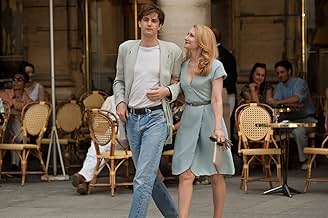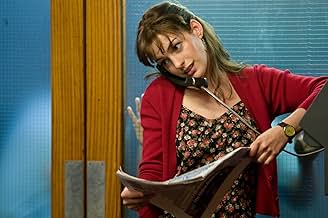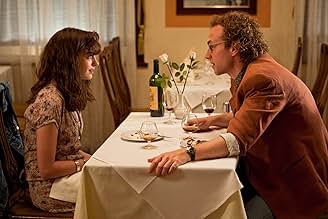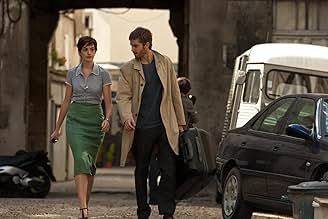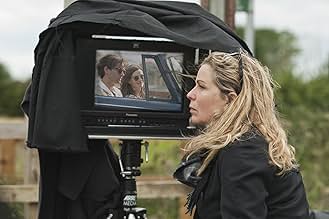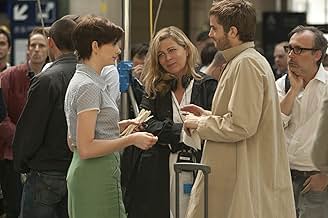Après avoir passé ensemble la nuit de remise des diplômes, les vies de Dexter et d'Emma sont montrées chaque année à la même date. Ils sont parfois ensemble ce jour-là, parfois ils ne le son... Tout lireAprès avoir passé ensemble la nuit de remise des diplômes, les vies de Dexter et d'Emma sont montrées chaque année à la même date. Ils sont parfois ensemble ce jour-là, parfois ils ne le sont pas.Après avoir passé ensemble la nuit de remise des diplômes, les vies de Dexter et d'Emma sont montrées chaque année à la même date. Ils sont parfois ensemble ce jour-là, parfois ils ne le sont pas.
- Prix
- 1 victoire et 2 nominations au total
Joséphine de La Baume
- Marie
- (as Josephine De La Baume)
Sutara Gayle
- Mrs. Major
- (as Lorna Gayle)
Avis en vedette
Very seldom in Hollywood are movies produced that are as emotionally involving as 'One Day.' It's a beautiful, beautiful love story of two people, Emma (Anne Hathaway) and Dex (Jim Sturgess). After spending the night together after graduation, we are taken on a journey into their lives for one day each year after they met; to see where they are or where they're not. Based on the book by David Nicholls (who also wrote the screenplay), 'One Day' transitions from novel to film brilliantly.
First let me say film acting is what I believe makes or breaks a movie - if the actors are great, the movie is generally great. That's not to take away from any other element of film at all, but when everything else is done so well, if the acting were bad, the film would have been less memorable. But Anne Hathaway and Jim Sturgess are so very impressive here. They make their characters real and relatable, which are two key things every actor internally wishes they could do. In fact, as an on-screen pair, they work extremely well, together they exude chemistry.
What I found most interesting about the entire experience was that I cared so much. I became enamoured with their lives. I kept hoping for the best. I anticipated what would happen to each of them. I sat forward, sat backward. I laughed and I cried. I've said many times before, a great movie will effect you emotionally in more ways than one. You'll be angry, you'll be happy, you'll be sad - the key is that you emote. This movie presented all of those elements. It was fresh and witty and everything you hope a movie will be. It's as beautifully made as it is acted and the locations are exquisite. Far too often, characters in Hollywood seem contrived and are not genuine. 'One Day' is honestly one of the most genuine stories ever told - there is no instant gratification, there is however frustration and that is the beauty of it all. It explores love and love lost, it explores friendship and the constraints of time and distance. It explores each character's journey to happiness and the trials they face along the way. So many little pieces of the puzzle are filled in between the years by simple, single lines of dialogue or actions. It's not the typical script of "everything's all good-obstacle-everything ends well" - there's a lot more complexity which makes it realistically genuine.
So many little details, like eye-lines, smiles, sighs, cut-off conversations, etc. were paid attention to. The costuming, cinematography and score were spot on and all noteworthy. All of it combined was moving and awe-inspiring. I left the theater crying, but it didn't stop there, even thinking about the movie and those characters is deeply affecting. Maybe there are some underlying themes in the film that I'm identifying with, or maybe, just maybe the actors were really that great. Whatever it is, this film comes with my highest recommendation, is rated PG-13 and runs 107 minutes.
First let me say film acting is what I believe makes or breaks a movie - if the actors are great, the movie is generally great. That's not to take away from any other element of film at all, but when everything else is done so well, if the acting were bad, the film would have been less memorable. But Anne Hathaway and Jim Sturgess are so very impressive here. They make their characters real and relatable, which are two key things every actor internally wishes they could do. In fact, as an on-screen pair, they work extremely well, together they exude chemistry.
What I found most interesting about the entire experience was that I cared so much. I became enamoured with their lives. I kept hoping for the best. I anticipated what would happen to each of them. I sat forward, sat backward. I laughed and I cried. I've said many times before, a great movie will effect you emotionally in more ways than one. You'll be angry, you'll be happy, you'll be sad - the key is that you emote. This movie presented all of those elements. It was fresh and witty and everything you hope a movie will be. It's as beautifully made as it is acted and the locations are exquisite. Far too often, characters in Hollywood seem contrived and are not genuine. 'One Day' is honestly one of the most genuine stories ever told - there is no instant gratification, there is however frustration and that is the beauty of it all. It explores love and love lost, it explores friendship and the constraints of time and distance. It explores each character's journey to happiness and the trials they face along the way. So many little pieces of the puzzle are filled in between the years by simple, single lines of dialogue or actions. It's not the typical script of "everything's all good-obstacle-everything ends well" - there's a lot more complexity which makes it realistically genuine.
So many little details, like eye-lines, smiles, sighs, cut-off conversations, etc. were paid attention to. The costuming, cinematography and score were spot on and all noteworthy. All of it combined was moving and awe-inspiring. I left the theater crying, but it didn't stop there, even thinking about the movie and those characters is deeply affecting. Maybe there are some underlying themes in the film that I'm identifying with, or maybe, just maybe the actors were really that great. Whatever it is, this film comes with my highest recommendation, is rated PG-13 and runs 107 minutes.
One Day Two eighties graduates in Edinburgh have an encounter on graduation day, July 15th ; the film follows their relationship by annual updates. Dexter (Jim Sturgess) brilliant, charismatic and a total narcissist and Emma (Ann Hathaway), a demure, warm sort are not a great match and both hitch up with others, but their friendship endures.
The film is romantic, but only to a point, and can hardly be described as a comedy; there is too much pain for that, despite some funny dialogue. It is a kind of growing older movie – early promise turning sour, bright young ambitious things tasting failure and settling for something less. The story is cleverly told and nicely shot, with good support from Ken Stott and Patricia Clarkson as Dexter's disapproving parents and Rhys Spall as Emma's husband. Jim Sturgess looks and acts uncannily like a younger Rupert Graves, who has portrayed a long line of charming handsome wastrels. Ann Hathaway might be from New York but she plays Emma perfectly – the dialect coaches really earned their money. Both of the principals manage to evoke our sympathy, though Sturgess has the harder job.
July 15 is St Swithin's day. On that day in 1415 the English Army led by Henry V (alias Laurence Olivier or Kenneth Branagh) defeated a larger French force at Agincourt. This has absolutely nothing to do with the movie though Dexter and Emma do at one stage venture to Brittany, where they manage to lose their clothes in one of the film's more comedic moments.
I couldn't help feeling the story arc was rather predictable but I was absorbed nonetheless. At the end I'm not sure what the attraction was for Emma – she was smart enough to realise Dexter was a jerk but somehow she couldn't resist. He does get better – perhaps deep down she wanted to reform him. Or perhaps deep down she wanted to be a bit wild too. A film for generation Xers who are wondering what the hell happened to their youthful dreams and plans.
The film is romantic, but only to a point, and can hardly be described as a comedy; there is too much pain for that, despite some funny dialogue. It is a kind of growing older movie – early promise turning sour, bright young ambitious things tasting failure and settling for something less. The story is cleverly told and nicely shot, with good support from Ken Stott and Patricia Clarkson as Dexter's disapproving parents and Rhys Spall as Emma's husband. Jim Sturgess looks and acts uncannily like a younger Rupert Graves, who has portrayed a long line of charming handsome wastrels. Ann Hathaway might be from New York but she plays Emma perfectly – the dialect coaches really earned their money. Both of the principals manage to evoke our sympathy, though Sturgess has the harder job.
July 15 is St Swithin's day. On that day in 1415 the English Army led by Henry V (alias Laurence Olivier or Kenneth Branagh) defeated a larger French force at Agincourt. This has absolutely nothing to do with the movie though Dexter and Emma do at one stage venture to Brittany, where they manage to lose their clothes in one of the film's more comedic moments.
I couldn't help feeling the story arc was rather predictable but I was absorbed nonetheless. At the end I'm not sure what the attraction was for Emma – she was smart enough to realise Dexter was a jerk but somehow she couldn't resist. He does get better – perhaps deep down she wanted to reform him. Or perhaps deep down she wanted to be a bit wild too. A film for generation Xers who are wondering what the hell happened to their youthful dreams and plans.
"One Day", based on the novel of the same name, is the relationship of two people, Emma (Anne Hathaway) and Dexter (Jim Sturgess), as we see it on July 15th of each year. As can be expected from the nature of the story, it's a little dry, lacking in comedy. But then again, it's a romantic drama, not a romantic comedy.
As is the nature of the two media, movies can never be exactly the same as the novel. But the problem with this one is that they tried to; no story lines were removed. Almost everything was there, just shortened into mostly meaningless segments. I personally could have done with one less event in their lives, and perhaps a different ending, but they tried to be as faithful as possible.
What we have here is a movie about a relationship, but the novel was about the people. They traded in character depth and development so we can see them in their more attractive years falling in and out of love.
I wasn't very familiar with Jim Sturgess, having seen him play skinny, slightly nerdy, not as confident kids. Dexter is a different breed of guy. Just has high on self-confidence as he is on drugs and alcohol, he gets by on his looks – literally – he's a TV host. Although the different characteristics of Dexter weren't explicitly shown in the movie, Sturgess brought them out in him perfectly. Emma is a more complex character, with significant evolution to who she is throughout the years, except none of that is in the movie, so it just wasn't really possible for Hathaway to portray her as a more interesting person.
I would assume that watching "One Day" without the benefit of having read the novel would be a fairly confusing, empty experience. With the background that the novel gave me, I could fill in all the missing years and the unexplored layers to the characters, so there was still something to their relationship for me.
As is the nature of the two media, movies can never be exactly the same as the novel. But the problem with this one is that they tried to; no story lines were removed. Almost everything was there, just shortened into mostly meaningless segments. I personally could have done with one less event in their lives, and perhaps a different ending, but they tried to be as faithful as possible.
What we have here is a movie about a relationship, but the novel was about the people. They traded in character depth and development so we can see them in their more attractive years falling in and out of love.
I wasn't very familiar with Jim Sturgess, having seen him play skinny, slightly nerdy, not as confident kids. Dexter is a different breed of guy. Just has high on self-confidence as he is on drugs and alcohol, he gets by on his looks – literally – he's a TV host. Although the different characteristics of Dexter weren't explicitly shown in the movie, Sturgess brought them out in him perfectly. Emma is a more complex character, with significant evolution to who she is throughout the years, except none of that is in the movie, so it just wasn't really possible for Hathaway to portray her as a more interesting person.
I would assume that watching "One Day" without the benefit of having read the novel would be a fairly confusing, empty experience. With the background that the novel gave me, I could fill in all the missing years and the unexplored layers to the characters, so there was still something to their relationship for me.
Greetings from Lithuania.
I don't watch romantic movies often, but when i heard about story of "One day" i thought of giving it a chance. And it sure didn't disappoint me. This is a really good love story, told in a single day in a year in period of 23 years. Movie is beautifully filmed, with great acting by the two leads, especially from Anne Hathaway. She's just so ... beautiful in every meaning of this word. Can't wait to see her next summer in "TDKR". "One day" isn't your typical Hollywood love story and you can clearly FEEL that watching it.
Give this movie a chance and you can be really surprised that when this movie will end, you'll fell your self a little ... brighter.
I don't watch romantic movies often, but when i heard about story of "One day" i thought of giving it a chance. And it sure didn't disappoint me. This is a really good love story, told in a single day in a year in period of 23 years. Movie is beautifully filmed, with great acting by the two leads, especially from Anne Hathaway. She's just so ... beautiful in every meaning of this word. Can't wait to see her next summer in "TDKR". "One day" isn't your typical Hollywood love story and you can clearly FEEL that watching it.
Give this movie a chance and you can be really surprised that when this movie will end, you'll fell your self a little ... brighter.
Based on David Nichols' bestseller, "One Day" is a more mature Nicholas Sparks version, but equally tearful and melodramatic. Based on a peculiar and intriguing narrative structure, which revisits the 15th of July in the lives of Dexter and Emma since 1988 over more than 20 years, the story focuses on the maturation of the relationship between its characters, fleeing the punctuality and immediacy that surrounds most novels. Ironically, this same artifice reveals the main weakness of the script - others will be seen in the following paragraphs - because the annual reunion with the characters does not hide the considerable loss of information that motivated sudden changes in the life and behavior of each one.
Sensitively directed by the Danish Lone Scherfig ("Education"), who delicately builds the fluid dynamic between Dexter and Emma (Hathaway), One Day is skillful in establishing the passage of time also with the aid of an impeccable make-up job - and notice how Sturgess, in particular, goes from a smooth-faced, jovial boy to a weary middle-aged man with wrinkles and bags under his eyes, while Hathaway emerges chubby (but not exaggeratedly so) after working two years as a waitress in a Mexican restaurant, which is an interesting detail. Benefiting from a competent cast that creates equally complex secondary characters that help compose the journey of the main couple (worth mentioning Rafe Spall, son of Timothy, who transforms the aspiring comedian Ian into a man that is simultaneously pathetic and moving), the film fails here and there by investing in stereotyped characterizations, but still avoiding that they dominate the narrative - and if Dexter's father appears as the typical "cold and critical father", Ken Stott manages to make him softer through occasional hesitations that point out his internal effort to try to get closer to the child.
Likewise, if Nicholls' dialogues are occasionally forced to appeal to exposition in order to clarify what happened to the characters in the previous year, this is balanced by the good construction of so many other lines (especially those spoken by Hathaway), which they display the cold irony typical of British humor (Emma at one point describes the restaurant where she works as a "graveyard of ambitions"). As if that were not enough, the script also creates really sensitive interactions between those people, highlighting the brief and beautiful scene between Dexter and his mother, who, played by Patricia Clarkson, shows melancholy and love when telling her son that, even certain that he will be a good man, realizes that he "isn't there yet".
The dialogues are a strong point of the script, also written by David Nicholls. They are fast, with intelligent insights and manage to perfectly translate the personality of each character and their relationships with each other. Even with silly jokes, like Dexter's mother in Paris saying to her son, "look over there, Alain Delon" ... or not, it's your father", demonstrating how much she is in love with her husband. There are funny scenes too, like when Dexter plays the most famous scene of Spartacus with the dolls for his daughter. But no character is better translated by the dialogues than Emma, the shy girl, but extremely intelligent and sagacious. Each of her lines is a bit of her temperament, feeling, spontaneity.
However, it is even in the construction of Dexter and Emma that "One Day" proves to be particularly efficient: while the boy quickly achieves professional success, the girl struggles for years trying to make her artistic aspirations viable - a situation that gradually reverses as that we perceive that the former lacks the intellectual, emotional and psychological content that sustains his career, while Emma, growing from suffering, reflection and the simple experience of life, gradually transforms herself into a mature woman and ready to overcome the obstacles that previously prevented it from moving forward (and Sturgess and Hathaway, talented and charismatic, confidently illustrate these changes).
The problem is that Hathaway's character quickly becomes the link with the audience. The dreamy sweetness, the sweetness and the detachment transform Emma into a very pleasant company, something that Dexter cannot see. Unsympathetic, self-centered and narcissistic, he uses Emma more as someone to quench the loneliness caused by her personality and assuage her pain and addictions than as a true friendship. Played by the expressionless Sturgess and his characteristic face of suffering, it is practically impossible to believe the beautiful and sensitive Emma fell in love with the guy after a disastrous dinner in which he exposes her (dis)interest. In this way, she emerges as the tragic anchor of the narrative, surrendering herself to the loves of a person she does not love, just to fill the sentimental need. What is revealed in the most cliché of sentences, enunciated according to the Nicholas Sparks booklet: "she made him decent; you made her happy".
As Emma and Dexter mature, the adolescent, dreamy and inconsequential traits give way to realistic, cynical and disillusioned versions, propelled by tragedies, some of them approached with excessive disregard and disengagement due to the narrative structure - yet another negative effect of this. Elevated to the status of protagonist, an incorrect and questionable decision, Dexter undergoes a wide dramatic arc from his mother's illness (Clarkson), the cancellation of the television program, his marriage to Sylvie (Romola Garai, the young woman from "Desire and Reparation" and increasingly better actress), to an event that would definitely humanize him. At times, Emma's life is described in terms of her dream of becoming a writer or her relationship with Ian (Rafe Spall), which is disappointing.
By scrutinizing and dissecting fractions of those characters' lives, certain moments should be more appropriately explored in David Nicholls' script. Dexter's firing after a botched interview and being hired on a video game show lacks a glimpse into the character's journey, though we understand what led to this precipitous fall. Similarly, Emma's relationship with Ian, presented at a dinner party without sparks or the guy's inability to make jokes, culminates in the explanation that she can't "take him watching Wrath of Khan every day anymore". This excessive exposition becomes constant in the film, requiring that a character needs to contextualize the events that are taking place to the public, which exposes the artificiality of the undertaking; well, if Emma and Dexter are such good friends, it was expected that he would reveal the bad news in the expected time and not months later.
On the other hand, the annual narrative is well explored by Danish director Lone Scherfig, and the use of raccords and ellipses in Barney Pilling's montage stands out. And not just temporality, but the duo of characters allows Benoît Delhomme's photography to individualize Emma's trajectory in a nostalgic sepia, while Dexter is bathed in a depressing bluish color palette. Finally, Rachel Portman's score avoids being too intrusive, competently punctuating the narrative. Yes, the idea is curious and the narrative exercise valid (albeit flawed). The trajectory of two people is drawn before our eyes and, let's face it, it's not something usual in novel production. It is a pity, therefore, that the chosen 15th of July sounds hopelessly clichéd and expositional, making the unknown 364 remaining days of each year seem more interesting by comparison.
We cannot, however, say that the film is not romantic. It has its moments, even if it prepares us to tears in such an obvious and brief way. Soon we will be in the next year, and the year after that, forgetting the pain and moving on. But that doesn't stop us from living in the moment. They are brief, it is true, but true and well-constructed. Especially in the final act, where we desperately want to go back to the beginning, as an attempt to remake the story, or at least fool our minds with that simple encounter in the middle of the street and a kiss seals the love story that should have been. Director Lone Scherfig managed to bring delicacy to the story of Emma and Dexter, making "One Day" a sensitive film. A love story built without resources common to films of this nature. Everything is almost realistic and fearful as life. She regrets that, when the situation picks up, she pulls the rug out from under us, with a cliché situation, announced, made just to make us cry. And she didn't even make it. Still, a good movie of its kind.
Sensitively directed by the Danish Lone Scherfig ("Education"), who delicately builds the fluid dynamic between Dexter and Emma (Hathaway), One Day is skillful in establishing the passage of time also with the aid of an impeccable make-up job - and notice how Sturgess, in particular, goes from a smooth-faced, jovial boy to a weary middle-aged man with wrinkles and bags under his eyes, while Hathaway emerges chubby (but not exaggeratedly so) after working two years as a waitress in a Mexican restaurant, which is an interesting detail. Benefiting from a competent cast that creates equally complex secondary characters that help compose the journey of the main couple (worth mentioning Rafe Spall, son of Timothy, who transforms the aspiring comedian Ian into a man that is simultaneously pathetic and moving), the film fails here and there by investing in stereotyped characterizations, but still avoiding that they dominate the narrative - and if Dexter's father appears as the typical "cold and critical father", Ken Stott manages to make him softer through occasional hesitations that point out his internal effort to try to get closer to the child.
Likewise, if Nicholls' dialogues are occasionally forced to appeal to exposition in order to clarify what happened to the characters in the previous year, this is balanced by the good construction of so many other lines (especially those spoken by Hathaway), which they display the cold irony typical of British humor (Emma at one point describes the restaurant where she works as a "graveyard of ambitions"). As if that were not enough, the script also creates really sensitive interactions between those people, highlighting the brief and beautiful scene between Dexter and his mother, who, played by Patricia Clarkson, shows melancholy and love when telling her son that, even certain that he will be a good man, realizes that he "isn't there yet".
The dialogues are a strong point of the script, also written by David Nicholls. They are fast, with intelligent insights and manage to perfectly translate the personality of each character and their relationships with each other. Even with silly jokes, like Dexter's mother in Paris saying to her son, "look over there, Alain Delon" ... or not, it's your father", demonstrating how much she is in love with her husband. There are funny scenes too, like when Dexter plays the most famous scene of Spartacus with the dolls for his daughter. But no character is better translated by the dialogues than Emma, the shy girl, but extremely intelligent and sagacious. Each of her lines is a bit of her temperament, feeling, spontaneity.
However, it is even in the construction of Dexter and Emma that "One Day" proves to be particularly efficient: while the boy quickly achieves professional success, the girl struggles for years trying to make her artistic aspirations viable - a situation that gradually reverses as that we perceive that the former lacks the intellectual, emotional and psychological content that sustains his career, while Emma, growing from suffering, reflection and the simple experience of life, gradually transforms herself into a mature woman and ready to overcome the obstacles that previously prevented it from moving forward (and Sturgess and Hathaway, talented and charismatic, confidently illustrate these changes).
The problem is that Hathaway's character quickly becomes the link with the audience. The dreamy sweetness, the sweetness and the detachment transform Emma into a very pleasant company, something that Dexter cannot see. Unsympathetic, self-centered and narcissistic, he uses Emma more as someone to quench the loneliness caused by her personality and assuage her pain and addictions than as a true friendship. Played by the expressionless Sturgess and his characteristic face of suffering, it is practically impossible to believe the beautiful and sensitive Emma fell in love with the guy after a disastrous dinner in which he exposes her (dis)interest. In this way, she emerges as the tragic anchor of the narrative, surrendering herself to the loves of a person she does not love, just to fill the sentimental need. What is revealed in the most cliché of sentences, enunciated according to the Nicholas Sparks booklet: "she made him decent; you made her happy".
As Emma and Dexter mature, the adolescent, dreamy and inconsequential traits give way to realistic, cynical and disillusioned versions, propelled by tragedies, some of them approached with excessive disregard and disengagement due to the narrative structure - yet another negative effect of this. Elevated to the status of protagonist, an incorrect and questionable decision, Dexter undergoes a wide dramatic arc from his mother's illness (Clarkson), the cancellation of the television program, his marriage to Sylvie (Romola Garai, the young woman from "Desire and Reparation" and increasingly better actress), to an event that would definitely humanize him. At times, Emma's life is described in terms of her dream of becoming a writer or her relationship with Ian (Rafe Spall), which is disappointing.
By scrutinizing and dissecting fractions of those characters' lives, certain moments should be more appropriately explored in David Nicholls' script. Dexter's firing after a botched interview and being hired on a video game show lacks a glimpse into the character's journey, though we understand what led to this precipitous fall. Similarly, Emma's relationship with Ian, presented at a dinner party without sparks or the guy's inability to make jokes, culminates in the explanation that she can't "take him watching Wrath of Khan every day anymore". This excessive exposition becomes constant in the film, requiring that a character needs to contextualize the events that are taking place to the public, which exposes the artificiality of the undertaking; well, if Emma and Dexter are such good friends, it was expected that he would reveal the bad news in the expected time and not months later.
On the other hand, the annual narrative is well explored by Danish director Lone Scherfig, and the use of raccords and ellipses in Barney Pilling's montage stands out. And not just temporality, but the duo of characters allows Benoît Delhomme's photography to individualize Emma's trajectory in a nostalgic sepia, while Dexter is bathed in a depressing bluish color palette. Finally, Rachel Portman's score avoids being too intrusive, competently punctuating the narrative. Yes, the idea is curious and the narrative exercise valid (albeit flawed). The trajectory of two people is drawn before our eyes and, let's face it, it's not something usual in novel production. It is a pity, therefore, that the chosen 15th of July sounds hopelessly clichéd and expositional, making the unknown 364 remaining days of each year seem more interesting by comparison.
We cannot, however, say that the film is not romantic. It has its moments, even if it prepares us to tears in such an obvious and brief way. Soon we will be in the next year, and the year after that, forgetting the pain and moving on. But that doesn't stop us from living in the moment. They are brief, it is true, but true and well-constructed. Especially in the final act, where we desperately want to go back to the beginning, as an attempt to remake the story, or at least fool our minds with that simple encounter in the middle of the street and a kiss seals the love story that should have been. Director Lone Scherfig managed to bring delicacy to the story of Emma and Dexter, making "One Day" a sensitive film. A love story built without resources common to films of this nature. Everything is almost realistic and fearful as life. She regrets that, when the situation picks up, she pulls the rug out from under us, with a cliché situation, announced, made just to make us cry. And she didn't even make it. Still, a good movie of its kind.
Le saviez-vous
- AnecdotesAnne Hathaway was clandestinely given the script, as director Lone Scherfig was not looking at any American actresses for the part of Emma. Hathaway flew to London for a meeting with Scherfig, which she described as "the worst meeting of my life. I was just inarticulate." However, on leaving Lone, she handed her a list of songs that she felt represented how she would interpret the character. It was this list that landed her the part.
- GaffesEmma and the other students are seen wearing mortarboards as they graduate in Edinburgh, however these are not worn at graduation at the University of Edinburgh (nor generally other universities in Scotland).
- ConnexionsFeatured in Nudes in the News: Show #250 (2011)
- Bandes originalesTalkin' 'Bout A Revolution
Words and music by Tracy Chapman
Performed by Tracy Chapman
Licensed Courtesy of Warner Music UK Limited
Meilleurs choix
Connectez-vous pour évaluer et surveiller les recommandations personnalisées
- How long is One Day?Propulsé par Alexa
- What is the first song she plays on the record player?
Détails
- Date de sortie
- Pays d’origine
- Site officiel
- Langue
- Aussi connu sous le nom de
- One Day
- Lieux de tournage
- sociétés de production
- Consultez plus de crédits d'entreprise sur IMDbPro
Box-office
- Budget
- 15 000 000 $ US (estimation)
- Brut – États-Unis et Canada
- 13 843 771 $ US
- Fin de semaine d'ouverture – États-Unis et Canada
- 5 079 566 $ US
- 21 août 2011
- Brut – à l'échelle mondiale
- 59 389 433 $ US
- Durée1 heure 47 minutes
- Couleur
- Mixage
- Rapport de forme
- 2.35 : 1
Contribuer à cette page
Suggérer une modification ou ajouter du contenu manquant








